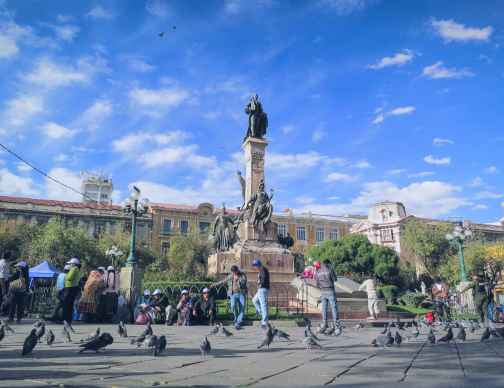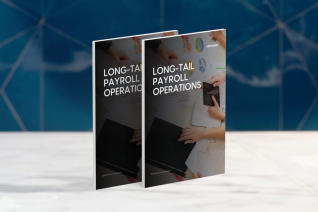Establish your presence globally with Neeyamo as we help you go beyond borders to manage your international payroll and hire new talent in Bolivia.
Overview
Bolivia is home to the world's largest salt flats in the world - Salar De Uyuni. This salt deposit spans over 10,500 kilometers and is as large as Hawaii! The salt lake is a huge tourist attraction as for a few weeks a year, during the rainy season, the large expanse of land turns into a mirror, reflecting everything on top of it. Bolivia isn't home to just this unique experience. It is also home to a vast workforce of unique and talented individuals.
Do your organization’s expansion plans require you to hire employees in Bolivia? Do you lack a physical entity in the country – a key requisite to hire local talent? Global payroll companies, such as Neeyamo, assist organizations worldwide with onboarding and managing employees in Bolivia - processing payroll, payroll accounting, and payroll software, managing local compliance requirements, benefits, and more.
Our Presence
Tools And Instances
Facts And Stats
Capital
Sucre
Currency
Boliviano (BOB)
Official Language
Spanish
Fiscal Year
1 January- 31 December
Date Format
DD/MM/YYYY
Country Calling Code
+591
Official Languages
Bolivia is the country with the most official languages (37). Aside from Spanish, as per the country's constitution, all the languages of the nation and the indigenous people are recognized as official languages. They include Aymara, Araona, Baure, Bésiro, Canichana, Cavineño, Cayubaba, Chácobo, Chimán, Ese Ejja, Guaraní, Guarasu’we, Guarayu, Itonama, Leco, Machajuyai-kallawaya, Machineri, Maropa, Mojeño-Trinitario, Mojeño-Ignaciano, Moré, Mosetén, Movima, Pacaa, Puquina, Quechua, Sirionó, Tacana, Tapiete, Toromona, Uru-Chipaya, Weenhayek, Yaminawa, Yuki, Yuracaré and Zamuco.
Time Zone
Bolivia Time Zone (UTC-04:00)
Global Payroll
Overview
What is Global Payroll?
Handling payroll for a widespread workforce can pose a significant challenge for any organization, and the added complication of compliance can make things worse. If companies spend more time processing payroll, it directly impacts day-to-day operations and their overall productivity. The solution to this is to outsource payroll services using a Global Payroll Solution like Neeyamo's.
What is a global payroll system?
Over the years, Neeyamo – Global Payroll Services has observed these complexities and strived to provide global payroll solutions through a single technology platform – Neeyamo Payroll. Neeyamo's global payroll systems ease the process for companies looking to outsource their global payroll requirements and aid them in maneuvering the tricky payroll system in Bolivia. Neeyamo's payroll software provides the perfect solution for all your global payroll needs – for employees working in primary geographies, the long-tail region, remote or internationally located.
How is payroll calculated?
Neeyamo acts as your personalized Payroll Calculator. Ensuring adherence to local regulatory requirements using multi-level controls. Providing timely and accurate payroll, courtesy of our experts worldwide and using a tech-based integrated smart helpdesk solution with seamless support experience manned by payroll experts - Neeyamo has all your payroll needs covered.
Payroll Taxes
Payroll tax is the percentage amount retained from an employee's salary and paid to the government to invest in the general population's welfare. These are statutory in nature and are levied from both the employer and employee. Additional statutory contributions are made by employers towards aiding both short-term and long-term benefits for their employees.
Employee Taxes
In Bolivia, the following contributions for employee taxes are made:
- Long-term SSO Contribution (Disability, Old Age and Death) - 10.00%
- Common Risk - 1.71%
- Pensionary Fund Commission - 0.50%
- Solidarity Contribution for Pension - 0.50%
- Total Employee Cost - 12.71%
Employer Taxes
The following employer tax deductions are made in Bolivia:
- Housing - 2.00%
- Professional Risk Premium - 1.71%
- National Healthcare - 10.00%
- Employer Solidarity Contribution - 3.00%
- Total Employment Cost - 16.71%
Payroll Cycle
Overview
Undoubtedly, payroll is a critical process for any organization. Pay cycle in Bolivia refers to the period for which an organization pays its employees, and this can vary depending on the pay frequency that the organization chooses to adopt.
Frequency
The payroll frequency is Monthly in Bolivia.
13th Month Cycle
In Bolivia, a 13th salary is required at the end of the year and is equivalent to one month’s pay.
Christmas bonus is not subject to tax and social security contributions.
14th-month salary is also a mandatory bonus if GDP is over 4.50% or makes annual profits. All employees must receive one additional monthly salary, subject to a cap of 25.00% of the company’s profits.
Global Work
Overview
An Employer of Record (EOR) service provider helps you eliminate the hassle of handling complexities while onboarding a new employee in an international location. They help bridge the gap that otherwise mandates organizations to have a local registered entity and a local bank account, prior to making a job offer to an international hire.
An EOR service provider acts as a legal employer, facilitates salary payments, and manages other statutory requirements such as health insurance, payroll taxes, and employee benefits ensuring compliance with local tax laws and regulations.
This allows organizations to focus on collaborating with employees in Bolivia for operational tasks, knowing they have a cost-effective solution to support their global corporate payroll services & HR requirements as they continue their global expansion.
Neeyamo, using its Cloud-based Payroll and HR services, strives to provide its customers with a seamless employee management experience and offers employer of record as well with our Global Payroll Technology Stack.
HR Mandates and Practices
Minimum Wage
As of January 1, 2023, the monthly minimum wage in Bolivia is 2,362 BOB
Overtime
The labour inspection authority must approve overtime. It is limited to no more than 2 hours per day once approved.
Overtime is compensated at a rate of 200% of regular pay for both non-working days and overtime hours.
Data Retention Policy
As per the data retention policy in Bolivia, documents related to the operations, microfilmed, registered in magnetic, and/or electronic media, must be in custody for a period not less than ten years.
Hiring and Onboarding Requirements
Hiring
In Bolivia, employers must register with the Ministry of Labour and social security entities. Businesses with a registered entity in Bolivia must employ a workforce that consists of at least 85 percent nationals. Failure to comply can result in sanction.
Onboarding
Employers must submit a signed employment contract to the Ministry of Labour for approval. Under the labour law, the contract must be drafted in Spanish. It must include
Required documents
- The names of all parties involved.
- The employed party’s personal data.
- The nature of the employee’s position.
- The duration of the contract.
- The payment period, method, and amount of the worker’s salary.
- The employer’s strategy for measuring works (time, units of work, etc.).
- The place of work.
- The employee’s heir(s).
- Other considerations regarding valid employment contracts are as follows:
- Collective employment contracts are acceptable.
- Under most circumstances, an employment contract must be indefinite.
- The regulations established by the General Labour Law are implied terms within employment contracts.
Probation
Probation period for permanent employees is one to three months.
Leave
Public Holidays
There are 10 public holidays.
- Jan 1: New Year’s Day
- Jan 23: Plurinational State Foundation Day
- Feb 2: Candlemas
- Feb 20 and Feb 21: Shrove Monday and Tuesday (Carnival)
- Apr 7: Good Friday
- May 1: Labour Day
- Jun 8: Corpus Christi
- Jun 21: Wilkakuti
- Aug 2: Agrarian Reform Day
- Aug 6: Independence Day
- Oct 17: National Dignity Day
- Nov 2: All Souls Day
- Dec 25: Christmas Day
Sick Leave
Employees are paid for sick leave starting on the fifth day of illness and for a total of 26 weeks over the course of a year. A medical certificate proving illness must be presented by the employee.
If medical care is shown, the sick leave can be extended for another 26 weeks. An employee is entitled to 100% pay for common illnesses. The employer, on the other hand, is entitled to a 75% reimbursement from social security.
Maternity Leave
Mothers are entitled to a total of 90 days, which is divided into 45 days before the expected due date and 45 after the birth of the child. Pay given to a mother on maternity leave is 100% of the national minimum wage. However, the employer is entitled to receive a 90% reimbursement from social security.
From the 5th month of pregnancy, the mother is entitled to a prenatal subsidy and a nursing subsidy until the child is 1 year old. Both subsidies are the equivalent of one month’s salary per month.
From the date that the child is born, mothers are entitled to job protection of 1 year.
Paternity Leave
Fathers are entitled to three days' pay for the birth of a child. Fathers are liable to not losing their jobs for a year after their child is born.
Other Leave
There is no other statutory leave in Bolivia.
Termination
Notice Period
There is no mandatory notice period under Bolivian labour law.
Severance Pay
In Bolivia, severance pay is mandatory if applicable. Still, the amount differs based on the type of termination, i.e., termination by an employee, termination by mutual agreement, termination without cause, and termination with a cause in an indefinite term agreement and fixed-term agreement.
It is common for a severance payment to be calculated as one month’s regular salary payment for each completed year of service.
Visa
Overview
Non-citizens of Bolivia need to be registered with the Labour Ministry.
Foreign employees do not require work permits, but their work agreements must be registered with the Bolivian labour authorities within 90 days of signing. Employees need a special purpose visa to sign the agreement and a one-year residence visa.
Employee Background Checks
Legal and Background Checks
In Bolivia, the following verifications are done prior to employment:
- Criminal Records
- Civil records
- Education records
- Employment verification
- Motor vehicle records- If required by employer
Last updated on April 30, 2023.
If you have any queries or suggestions, reach out to us at irene.jones@neeyamo.com
Have Queries? Get In Touch With Us
Get in touch with one of our experts and take a quick demo of our services









